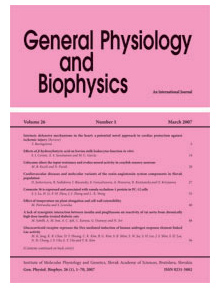Journal info
|
||
Select Journal
Journals
Bratislava Medical Journal Ekologia - Ecology Endocrine Regulations General Physiology and Biophysics 2025 2024 2023 2022 2021 2020 2019 2018 2017 2016 2015 2014 2013 2012 2011 2010 2009 2008 2007 Neoplasma Acta Virologica Studia Psychologica Cardiology Letters Psychológia a patopsych. dieťaťa Kovove Materialy-Metallic Materials Slovenská hudba 2025Webshop Cart
Your Cart is currently empty.
Info: Your browser does not accept cookies. To put products into your cart and purchase them you need to enable cookies.
General Physiology and Biophysics Vol.36, No.4, p.391–398, 2017 |
||
| Title: Effect of maternal renin-angiotensin-aldosterone system activation on social coping strategies and gene expression of oxytocin and vasopressin in the brain of rat offspring in adulthood | ||
| Author: Tomáš Senko, Pavel Svitok, Lucia Kršková | ||
| Abstract: The intrauterine condition in which the mammalian foetus develops has an important role in prenatal programming. The aim of this study was to determine the extent to which activation of the maternal renin-angiotensin-aldosterone system (RAAS) could influence social behaviour strategies in offspring via changes in social neurotransmitters in the brain. Pregnant female Wistar rats were implanted with osmotic minipumps which continually released angiotensin II for 14 days at concentration of 2 μg/kg/h. The adult offspring (angiotensin and control groups) underwent a social interaction test. The mRNA expression of vasopressin, oxytocin and the oxytocin receptor in selected brain areas was measured by in situ hybridisation. Prenatal exposure to higher levels of angiotensin II resulted in a strong trend toward decreased total social interaction time and significantly decreased time spent in close proximity and frequency of mutual sniffing. The angiotensin group showed no changes in oxytocin mRNA expression in the hypothalamic paraventricular or supraoptic nuclei, but this group had reduced vasopressin mRNA expression in the same areas. We concluded that maternal activation of RAAS (via higher levels of angiotensin II) caused inhibition of some socio-cohesive indicators and decreased vasopressinergic activity of offspring. Taken together, these results suggest a reactive rather than proactive social coping strategy. |
||
| Keywords: Renin-angiotensin-aldosterone system — Angiotensin II — Social coping — Prenatal programming | ||
| Published online: 13-Sep-2017 | ||
| Year: 2017, Volume: 36, Issue: 4 | Page From: 391, Page To: 398 | |
| doi:10.4149/gpb_2017013 |
||
|
|
 download file download file |
|

